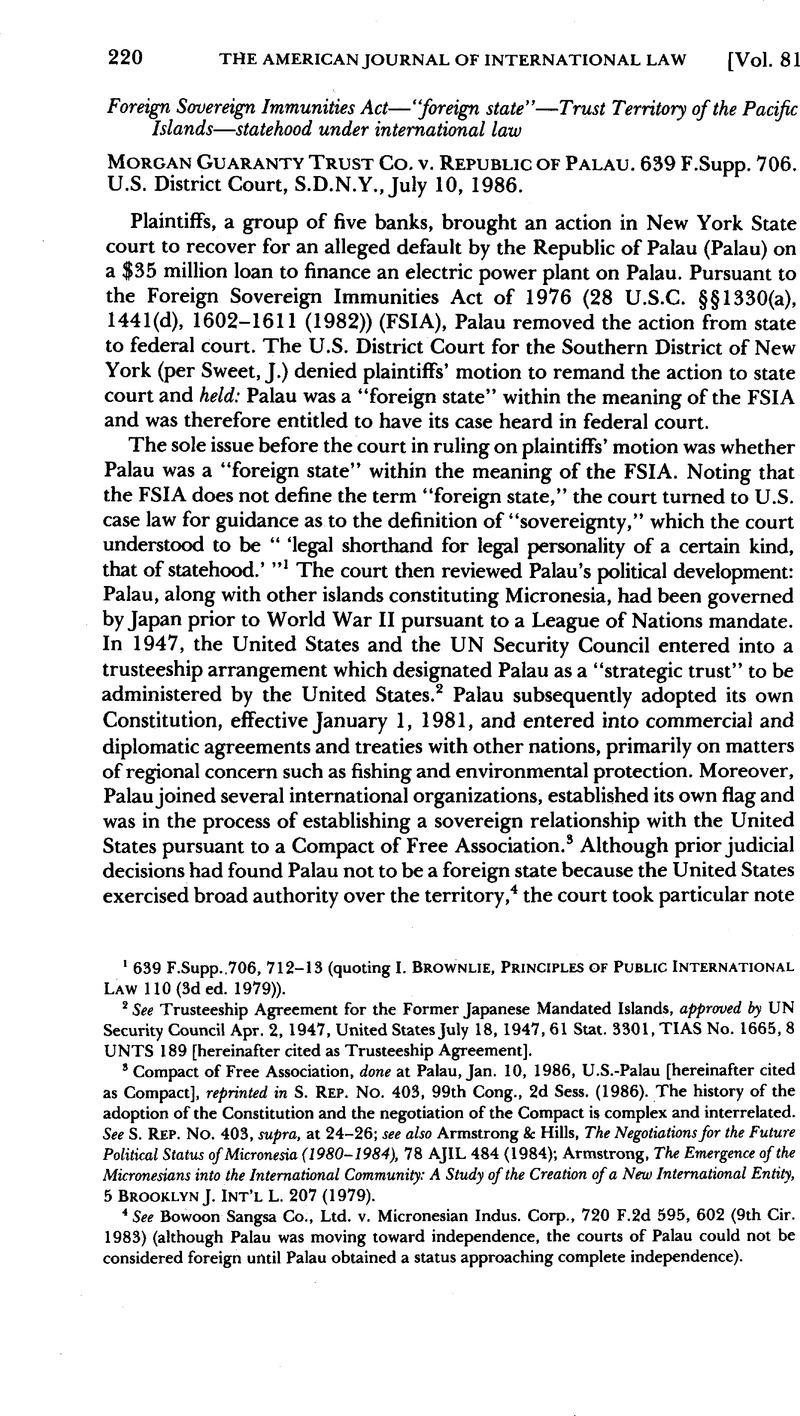No CrossRef data available.
Published online by Cambridge University Press: 27 February 2017

1 639 F.Supp., 706, 712–13 (quoting Brownue, I., Principles of Public International Law 110 (3d ed. 1979)Google Scholar).
2 See Trusteeship Agreement for the Former Japanese Mandated Islands, approved by UN Security Council Apr. 2, 1947, United States July 18, 1947, 61 Stat. 3301, TIAS No. 1665, 8 UNTS 189 [hereinafter cited as Trusteeship Agreement].
3 Compact of Free Association, done at Palau, Jan. 10, 1986, U.S.-Palau [hereinafter cited as Compact], reprinted in S. Rep. No. 403, 99th Cong., 2d Sess. (1986). The history of the adoption of the Constitution and the negotiation of the Compact is complex and interrelated. See S. Rep. No. 403, supra, at 24–26; see also Armstrong & Hills, The Negotiations for the Future Political Status of Micronesia (1980–1984), 78 AJIL 484 (1984); Armstrong, The Emergence of the Micronesians into the International Community: A Study of the Creation of a New International Entity, 5 Brooklyn J. Int’l L. 207 (1979).
4 See Bowoon Sangsa Co., Ltd. v. Micronesian Indus. Corp., 720 F.2d 595, 602 (9th Cir. 1983) (although Palau was moving toward independence, the courts of Palau could not be considered foreign until Palau obtained a status approaching complete independence).
5 Trusteeship Agreement, supra note 2, Art. 3.
6 639 F.Supp. at 713.
7 Id. at 714.
8 Id. at 713 (citing Murarka v. Bachrack Bros., 215 F.2d 547 (2d Cir. 1954) (de facto recognition of India by the United States prior to India’s complete independence), and Betancourt v. Mutual Preserve Fund Life Ass’n, 101 F. 305 (C.C.S.D.N.Y. 1900) (de facto recognition of Cuba subsequent to end of U.S. occupation after U.S.-Spanish War of 1898)).
9 639 F.Supp. at 714.
10 Compact, supra note 3, Preamble, cl. 6, and Art. 1, §§111 and 121.
11 639 F.Supp. at 714.
12 Id. at 716.
13 See generally Crawford, J., The Creation of States in International Law (1979)Google Scholar; Macdonald, Termination of the Strategic Trusteeship: Free Association, the United Nations and International Law, 7 Brooklyn J. Int’l L. 235 (1981).
14 639 F.Supp. at 712 (relying on United States v. Spelar, 338 U.S. 217, 223 (1949) (Frankfurter, J., concurring)).
15 TC Res. 2183 (LIU) (May 28, 1986), UN Doc. S/18124, reprinted in S. Rep. No. 403, supra note 3, at 362–63.
16 The current version of the Compact was approved by both houses of the Palau National Congress on Jan. 24, 1986, and subjected to a referendum held on Feb. 21, 1986, which was observed by a UN mission. Subsequently, the President of Palau certified that the Compact had been approved in compliance with Palau’s Constitution. The President of the United States then submitted to the U.S. Congress a draft joint resolution to approve the Compact. See H.R.J. Res. 626 and S.J. Res. 77, 99th Cong., 2d Sess. (1986). The measures were favorably reported out of the House Committee on Interior and Insular Affairs in July 1986 (see H.R. Rep. No. 663, 99th Cong., 2d Sess. (1986)), and the Senate Committee on Energy and Natural Resources in August 1986 (see S. Rep. No. 403, supra note 3). On Sept. 17, 1986, however, the Appellate Division of the Supreme Court of Palau confirmed a summary judgment of the Trial Division of the Supreme Court invalidating the ratification of the Compact by the President of Palau. Gibbons v. Salii, No. 8-86 (App. Div. 1986) (certain Compact provisions permitting the United States or nations designated by it to bring nuclear substances into the territory of Palau were not approved by the constitutionally mandated majority).